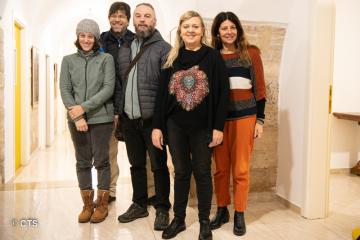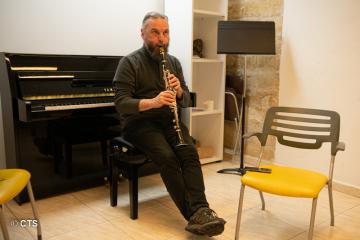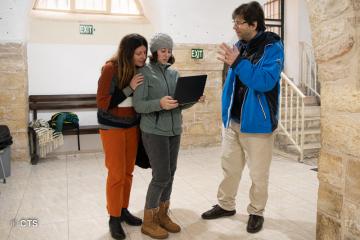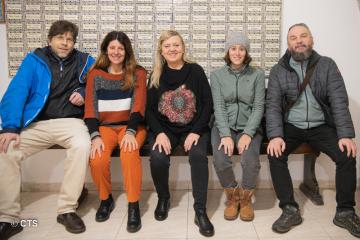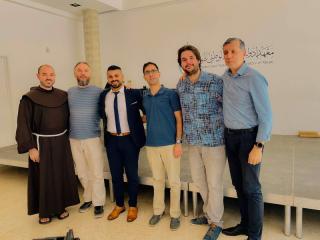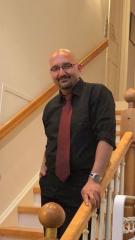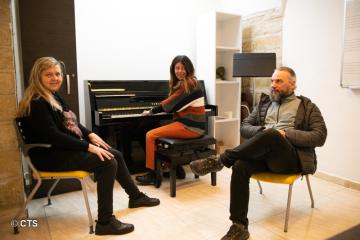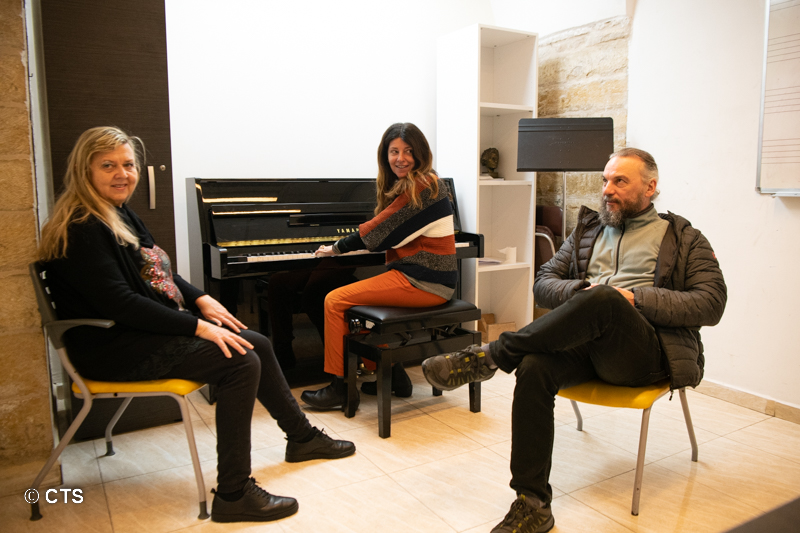
Exams are in the air at the Magnificat, the music conservatoire that stands in the heart of the Old City of Jerusalem. Now well-known and firmly rooted in the area, the Magnificat, which aims to encourage cohabitation and dialogue through the language of music, has over two hundred students of all levels and, above all, of every nationality, religion and ethnic group. The half-yearly exams are being held at the moment and the examiners have come from Italy, Vicenza to be precise.
“Yes,” fr. Alberto Joan Pari, Director of the Magnificat explains, “because since 2005 the Magnificat can boast of a prestigious international collaboration with the Pedrollo Conservatoire of Vicenza, so that the Magnificat today is the only institution in the Israeli and Palestinian territory to give titles recognized abroad, thanks to an agreement with the Italian conservatoire recognized by the Italian Ministry of Education: this is why all the exams, including the entrance exams, are overseen by a special Italian board of examiners who periodically come to Jerusalem.”
Elisabetta Andreani, who teaches singing, is the contact person of the Magnificat at the Pedrollo, and has been coming regularly to Jerusalem for seven years. “Since 2013, thanks to the agreement approved by the Italian Ministry of Education, the Magnificat has been able to award academic titles of the 1st level and then since 2016 of the 2nd level, as well as organizing the preparatory courses for access to the academic level. We are very proud of this educational collaboration,” Ms, Andreani emphasizes. “as it has also given the opportunity to two Palestinians, Jiries Boullata and Ramzi Shomali, and an Armenian, Haig Aram Hagop Vosguerotchian, to attend and graduate from the Conservatoire of Vicenza. Haig taught piano and organ, but now lives abroad, while Jiries and Ramzi are currently teaching at the Magnificat and are the result of the joint commitment of these two institutions.”
The board of examiners is also made up of Francesco Galligioni, who teaches cello, and Adalberto Ferrari, teacher of clarinet, and Lucia D’Anna Freij, who teaches cello at the Magnificat together with Giuliana Mettini, deputy head teacher of the Magnificat and the contact person for the academic courses. The exam schedule is full and includes many subjects (such as History of music, Performance practice of Singing, Chamber Music, Ensemble music for wind instruments).
The Board has also witnessed the complex and often problematic daily life some young Palestinian students of the Magnificat have to endure: “One of our students, Musa Shebat, from Beit Sahour, cannot come here to Jerusalem,” Ms, Andreani says, “because the authorities do not let him cross the check point: so we cross the wall and meet him in Bethlehem so that he can sit the exam.” Musa Shebat plays the clarinet and is finishing his three years of study. Although he is not allowed to cross the wall, there are no problems for him to obtain a visa for Europe: this is because together with Tareq Wahba, the bass-baritone from Nablus who is studying opera in the first year of the two-year academic course, will be the first students from the Magnificat for a full semester of lessons in Vicenza, through an exchange programme recognized by the Italian Ministry of Education, similar to Erasmus. This is a reason of great pride for the Magnificat, which this way sees increasing acknowledgement of its prestige.
“There is one particular aspect characterizing these Palestinian youngsters and that I have always noticed in these seven years as contact person,” Elisabetta Andreani admits, “and it is their enthusiasm: in Italy of course there is determination, commitment and skill... but the enthusiasm that can be seen in these students is completely different. I remember the day that Musa passed the entrance exam for the school: some members of his family - his mother, his grandmother and his sister – were there and they cried with joy when he passed. A scene like that is inconceivable in Italy, but here these academic moments are seen as an extraordinary event.”
Giuliana Mettini agrees on the positive and stimulating experience of the collaboration with the Italian Conservatoire and reflects on the peculiarity of the young students whose background is very different background from the European one: “There are subjects that do not belong to the historical and musical culture of this people: it is a delicate task for us, as teachers, to make the students understand the beauty of the more difficult subjects and try to stimulate them to see the motivation behind them. The effort is then repaid by their passion when they put themselves on the line and the dedication and the commitment they put into their studies.”
Silvia Giuliano


